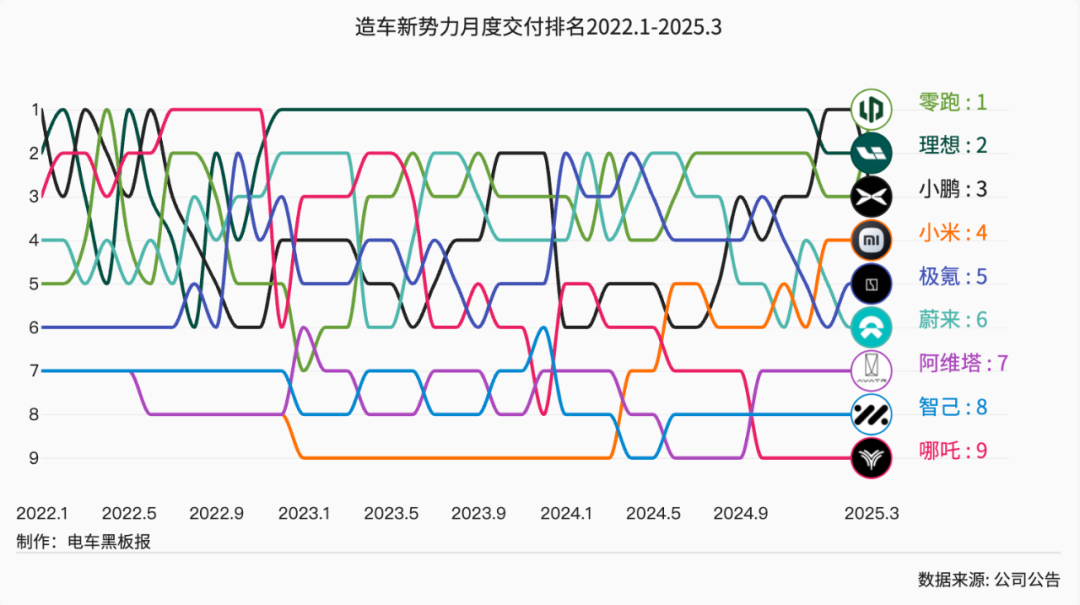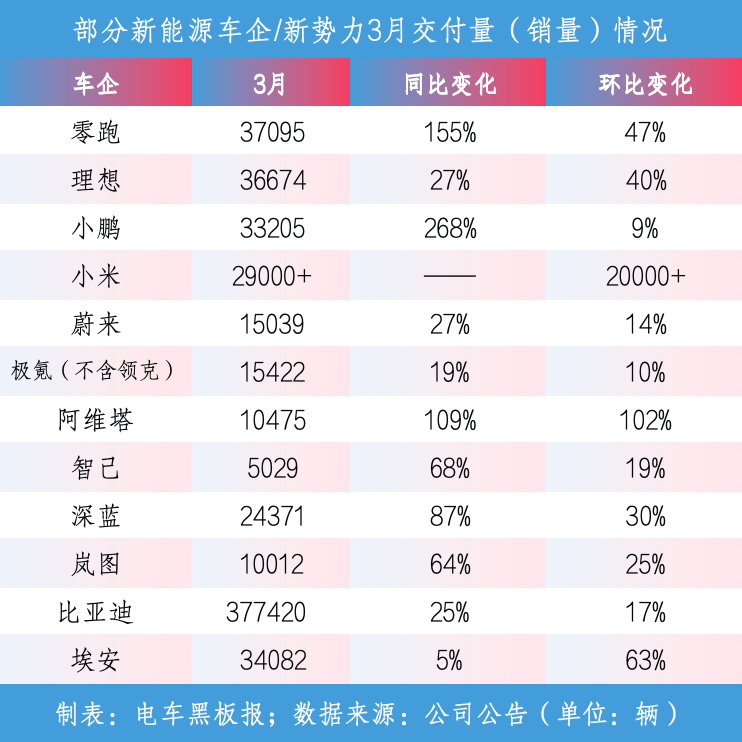Leapmotor Regains Monthly Sales Crown, Outpacing Li Auto and XPeng After 34 Months
![]() 04/02 2025
04/02 2025
![]() 657
657
It is widely acknowledged that the automotive industry faces a pivotal three-year period, where domestic emerging brands must continually boost sales to remain competitive in the manufacturing game.
XPeng briefly reclaimed the monthly sales crown for emerging automakers from Li Auto in January this year, but this position has swiftly changed hands again after just two months.
Analyzing the monthly delivery data released by various automakers on April 1, Leapmotor's March deliveries surged by 155% year-on-year to 37,095 units, marking a 47% increase month-on-month. This achievement places Leapmotor back at the top of monthly sales for emerging automakers after a 34-month hiatus. The company last led the pack in April 2022 with a monthly delivery volume of 9,087 units.

Li Auto ranked second among emerging automakers in March with 36,674 deliveries, up 27% year-on-year and 40% month-on-month. Li Xiang, CEO of Li Auto, stated that the L series models, which are pivotal for the company to swiftly achieve profitability and surpass 100 billion yuan in revenue, are on the verge of reaching the milestone of 1 million deliveries.
XPeng fell to third place. The company's March deliveries jumped by 268% year-on-year to 33,205 units, up 9% month-on-month, marking the fifth consecutive month of deliveries exceeding 30,000 units. Notably, the MONA M03 model delivered over 15,000 units for the fourth straight month, while the P7+ model surpassed 40,000 units in its first four months on the market.
NIO's March deliveries increased by 27% year-on-year to 15,039 units, up 14% month-on-month. The company's two brands, NIO and Lexdao, delivered 10,219 and 4,820 new vehicles, respectively. While NIO deliveries decreased by 14% year-on-year, Lexdao deliveries increased by 19% month-on-month. Xia Qinghua, vice president of Lexdao, noted at the end of March, "Orders have recently shown a noticeable recovery."

The substantial year-on-year and month-on-month growth in March deliveries by various automakers is closely tied to the car purchase incentives they offer.
Leapmotor continues to provide new car buyers with a trade-in subsidy of 20,000 yuan and a balance deduction ranging from 5,000 yuan to 15,000 yuan. Li Auto has reduced prices for L series models by 10,000 yuan to 16,000 yuan and maintains financial discount policies. XPeng has extended its "5-year zero-interest zero-down-payment" policy, launched in February, to March, covering four models excluding MONA M03 and P7+.
In addition to the ongoing car purchase discounts from automakers, the industry's peak season has also bolstered the sales growth of various emerging brands.
The Passenger Car Association previously analyzed that March is a traditional peak season for the auto market, characterized by manufacturers intensively releasing new technologies and car models, along with a continuous stream of new energy vehicle hits, providing strong support for the overall growth of the auto market. It is anticipated that the subsequent penetration rate will continue to increase steadily. According to preliminary estimates by the Passenger Car Association, retail sales of new energy passenger vehicles in March are expected to reach 1 million units, with the penetration rate rebounding to 54.1%.
While announcing March delivery data, some automakers also unveiled April car purchase incentives.
IM Motors announced up to 45,000 yuan in car purchase incentives for its LS6 model, including a 20,000 yuan cash deduction, a 15,000 yuan trade-in subsidy, and a 10,000 yuan balance reduction. Leapmotor extended its car purchase incentives for C series models into April, and the company's first B series vehicle, the B10, will be launched on April 10. Xiaomi Automobile extended the 90,000 yuan car purchase incentive for the SU7 Ultra's initial sales period to the end of April, with the incentive for the SU7 remaining unchanged.
After the four Hong Kong-listed emerging automakers – NIO, XPeng, Li Auto, and Leapmotor – released their March delivery data, the overall delivery volume for Q1 2025 was also disclosed simultaneously.

XPeng's Q1 cumulative deliveries of new vehicles surged by 331% year-on-year to 94,008 units, setting a new quarterly delivery record and exceeding the upper limit of the delivery guidance for the quarter of 91,000 to 93,000 units.
Li Auto and NIO delivered 92,864 and 42,094 vehicles in Q1, respectively, up 16% and 40% year-on-year. Li Auto is close to the upper limit of the Q1 delivery guidance of 88,000 to 93,000 vehicles provided in the company's previous financial report. NIO's quarterly data also met the company's expectations, with its Q1 delivery guidance being 41,000 to 43,000 vehicles.
Leapmotor's Q1 deliveries increased by 162% year-on-year to 87,552 units, and the company did not provide delivery guidance in its financial report.
Xiaomi Automobile, which has been selling cars for a full year, has yet to announce specific monthly delivery data. Lu Weibing, president of Xiaomi Group, posted on Weibo that Xiaomi Automobile delivered over 29,000 vehicles in March. He also mentioned that the current capacity expansion is progressing smoothly, expressing confidence in achieving the annual delivery target of 350,000 vehicles.
All emerging automakers except Li Auto have announced their sales targets for 2025. XPeng and NIO both aim to double their sales compared to 2024. Based on their 2024 delivery volumes, the sales targets for these two automakers in 2025 are 380,000 and 440,000 vehicles, respectively. Leapmotor initially set an annual sales target of 500,000 vehicles, which the company's management revised upwards to 500,000 to 600,000 vehicles during the financial report conference call in early March.
Regarding the completion rate of the annual targets, XPeng has achieved nearly a quarter, Xiaomi Automobile has surpassed 20%, and Leapmotor's rate falls between 15% and 18%. Relatively, NIO's completion rate is the least optimistic, at less than 10%.
Currently, the market's general expectation for Li Auto's sales target in 2025 remains 700,000 vehicles. Based on this projection, the company has completed 13% of its target.







